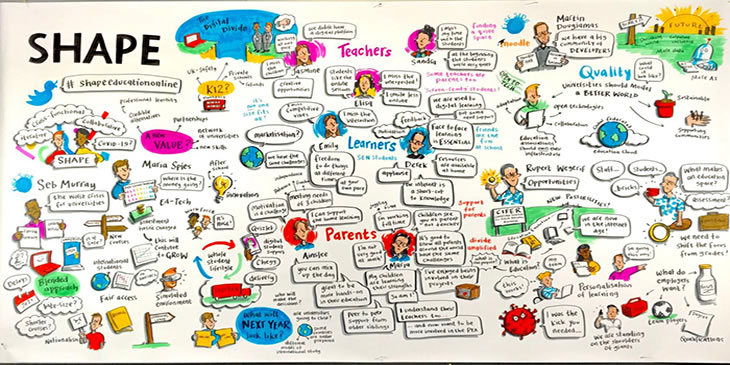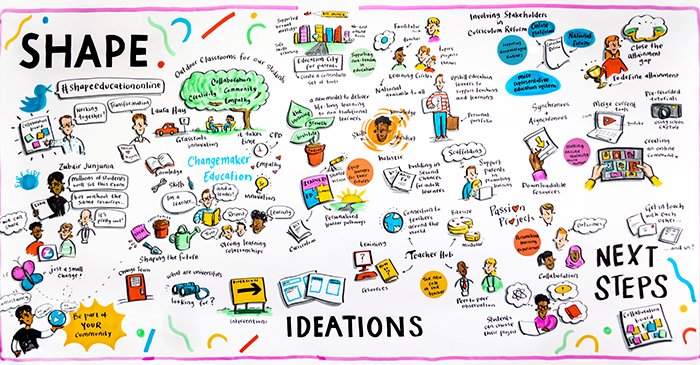On 27-28 May, Cambridge Assessment and Cambridge Judge Business School hosted SHAPE Education: Online, the first virtual SHAPE conference which invited delegates from around the world to tackle the question: Covid-19 is breaking our model of education! How do we react?
Dan Frost, Learning Technology Lead at Cambridge Assessment English and part of the team behind the SHAPE initiative, reflects on the online event and its outcomes.
This event was the first experiment in taking the SHAPE approach to an online environment. In order to translate what SHAPE is, the event needed to be a rich and exciting experience. As we're learning across the education industry and in our own work, doing things remotely can provide both new and interesting approaches whilst, at the same time, removing the things we take for granted.
The attendees were carefully chosen from a mix of backgrounds and interests, so we can break the silos which so often occur.
Day one - tackling the big questions
On day one, the event started broadly by hearing from journalist Seb Murray and Maria Spies CEO of HolonIQ. After audience Q&A, attendees were split into breakout groups for a workshop to make the most of the time to tackle the big questions, explore what opportunities there are and move closer to solving the big problems.
Attendees worked in virtual breakout rooms and collaborated on a giant virtual whiteboard with interactive post-it notes to capture the themes, insights and ideas coming out of what they are hearing and discussing.
The need was expressed many times to create environments where families, teachers and employers are partners in the education system, and where learning is seen as a fully integrated part of life for everyone.
Next, we heard from Professor Rupert Wegerif from the University of Cambridge and Martin Dougiamas, CEO of Moodle on challenging our models of education. This was followed by interviews with teachers, learners and parents from around the world which served to turn the analytical thinking into something human and personal.
Christel Wolthoorn of Lovedby Design (she also hosted our first ever SHAPE conference back in September 2019) expertly facilitated the event in order to keep the focus and managed time effectively. Christel ended day one by reflecting on what we had heard, and showed the work that Rebecca Osborne, our Graphic Recorder had been annotating live on a YouTube live stream during the day. The image was full of colour, conversations and quotes and captured the essence of what we had found.
Watch the talks and interviews from day one

Day two - the future
The second day was focused on the future. We started by hearing from Zubair Junjunia, Founder of ZNotes and Laura Hay from Changemakers about how we can build a different model of education and learn from the models where change takes place. Watch the talks from Zubair and Laura.
Starting with discussions of how new models, formats and delivery of education could come about we spent the day in various breakout groups. These groups focused on six themes taken from the first day’s whiteboards, taking them from an initial idea to some potential solutions.
This work – which makes the event intense but very productive – is why SHAPE events are designed how they are: to make the best possible use of the attendees’ time and promote deep discussion around complex problems.
This workshop activity creates an exciting and collaborative environment which gets the mix of stakeholders working together in a completely different way, out of their silos. Working together with people who are experiencing, working in or delivering education allowed us and everyone attending the event to learn lots and share their expertise.
The result was really rewarding, and the attendees enjoyed the format and the challenge of tackling the questions.
On the SHAPE website, we have highlighted the opportunity areas discussed at the event and encourage you to view, comment and share thoughts with your networks.

The outcome
There was a lot of discussion throughout the two days on how education can become more connected to ‘communities’, and through this become a true life-long learning experience for children and adults alike.
The need was expressed many times to create environments where families, teachers and employers are partners in the education system, and where learning is seen as a fully integrated part of life for everyone. This is a long way from the existing belief, held by many, that education is an exercise in ticking boxes and is limited by the constraints that the current system has placed around it.
The suggestions that the different groups came up with speak, in many cases, to the idea of changing that system through the creation of different communities.
As we take stock after this experiment, it’s clear that in hindsight the situation caused by Covid-19 has forced us to create a format which we can now scale globally far more easily than the face to face events we previously had planned.
Reflections from attendees
Following the event, we gave attendees the chance to reflect on the conference. Here is some of the feedback we've received.
"Can I congratulate you and all colleagues involved in organising today's event. Without doubt, it was the best online event I have participated in since lockdown began" - Louis Major
"The discussion was original, vibrant and extremely stimulating and the feedback we just got from one of the local participants was nothing short of ecstatic (she said among many other things 'an intellectual delight')" - Pablo Toledo
We are now planning future events around particular themes in education and regions of the world. If you’re interested in attending or think a particular theme should be tackled, sign up at shape-education.org. You can also join the conversation on Twitter #ShapeEducationOnline.